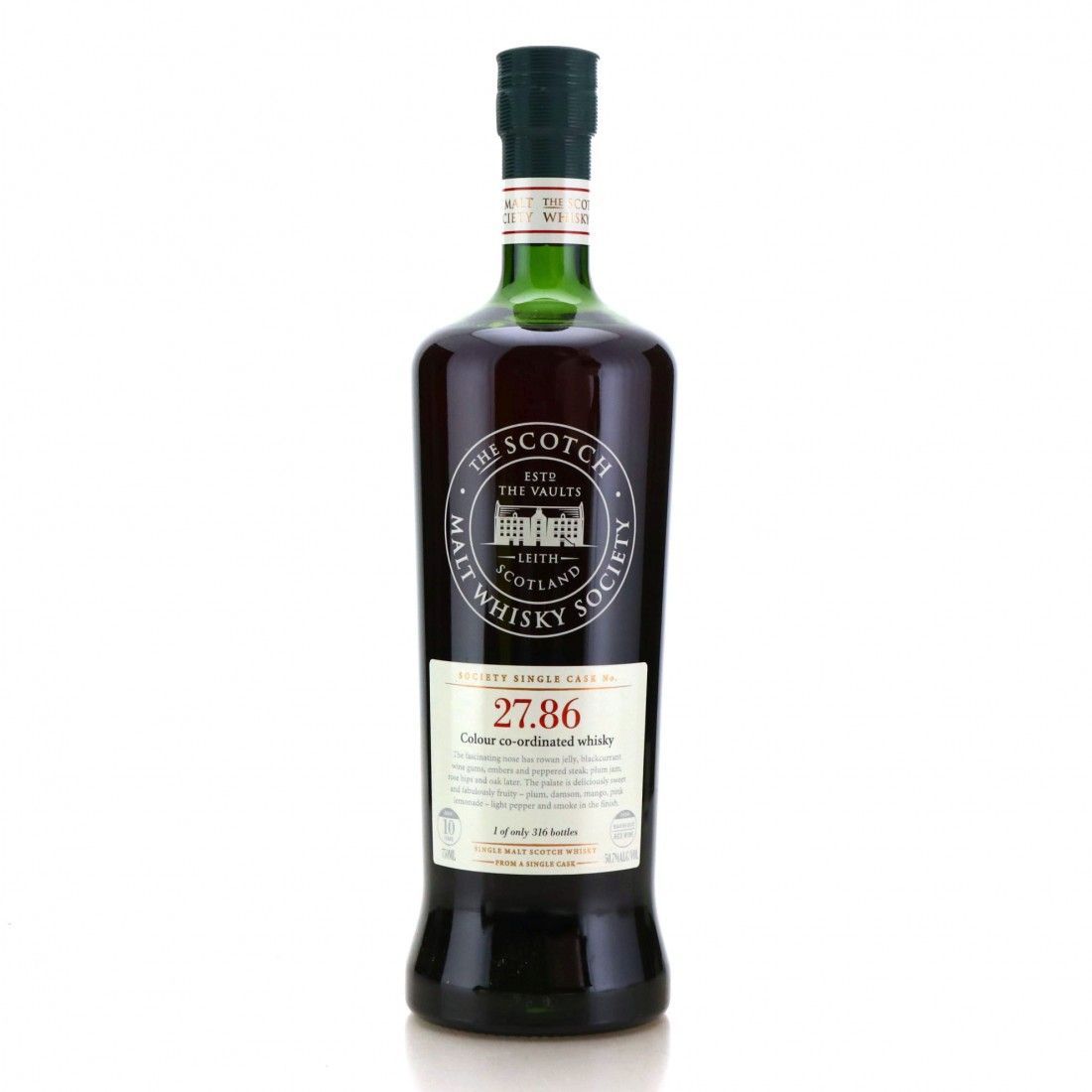Worldwide Delivery Lowest Price Online Rated 5 * Out of Hours Operation
(Please call for custom quotes) (Price match guaranteed) (Google) ( 7am - 11:30 pm)
Springbank 10 Year Old 2000 SMWS Single Red Wine Barrique 27.86 Campbeltown Single Malt Scotch Whisky (2010) 75cl
Springbank 10 Year Old 2000 SMWS Single Red Wine Barrique 27.86 Campbeltown Single Malt Scotch Whisky (2010) 75cl
1 of 316 bottles produced and mostly drunken back then in 2010. Before the Springbank craze commenced.
This is the USA release so a little more whisky at 75cl instead of 70cl.
It is such a delight to see some of the really early editions of the SMWS single cask bottlings. Even better to drink them!
The Scotch Malt Whisky Society was founded in Edinburgh in 1983 by Phillip 'Pip' Hills who, while travelling around Scotland in the 1970s, fell in love with whiskies drawn straight from the cask. After he expanded his syndicate the Society was purchased by Glenmorangie PLC in 2004. In 2015, the Society was sold back to private investors. In June 2021, the private owners floated the holding company The Artisanal Spirits Company plc on the Alternative Investment Market of the London Stock Exchange.
It has a unique code system where the first number refers to the distillery and the second refers to the cask from which the bottle comes. SMWS also offers the largest range of distilleries of any independent bottler. These curiously named drams really do have something for every whisky lover!
The SMWS are one of the Britain's most revered independent bottlers with a worldwide network of partner bars with one mission of getting as much whisky at natural cask strength without water to different nations including USA, Canada, Switzerland, UK, Austria, Germany and many others.
These older labels from the first runs are mostly with distillation methods that include direct heat which was replaced with steam for many distilleries for environmental reasons changing the taste of whisky forever. It'll get real interesting when nuclear fusion is used to distil whisky. We might glow green for a few weeks after we drink the stuff. Who knows.... but all we know is that the old stuff has a musky taste that is VERY welcomed by people nowadays trying to time travel through whisky's past.
Whisky Afficionado Review & TASTING NOTES
Nose:
The bottling opens with distinct fruity notes. Very fresh, with a hint of pink bubble gum. Then spicy notes, again replaced by fruit (cherry). Very unusual, but pleasant.
With water, the fruit notes become more intense, but form a suitable combination with the spicy touch.
Palate:
Undiluted, the fresh, fruity notes of cherries, apples, and pears continue in the taste with increasing sweetness. The sweetness tends towards acacia honey. The body is medium in volume with a beautiful complexity.
After adding water, the bottling becomes a touch sweeter, but the spicy note forms a suitable counterpart.
Finish:
The finish is medium-long with a coating in the mouth. Notes of dried apple slices with cherry jam and a hint of acacia honey, with and without water, complete the finale .
Conclusion:
Until now, I wasn't really convinced by aging in wine casks (or rather, the obligatory finishing). However, this is a complete aging in wine casks and has convinced me that non-Islay whiskies also perform very well with wine cask aging. An unusual bottling, but one that shows that there's still potential in this style.
About Springbank
Springbank is the only distillery in Scotland to malt, distil, mature and bottle on the same site. It manages to do this while operating a highly complex distillation regime, which creates three different styles.
The equipment at Springbank is resolutely old-style: an old Boby mill, an open-top cast-iron mash tun, wooden washbacks made from boatskin larch; and three stills, direct fire on one of them, a worm tub on another.
The malt is handled in three ways to produce three contrasting whiskies – Springbank itself is medium-peated, Longrow is heavily peated, while Hazelburn has no peat at all. Ferments are very long – in excess of 100 hours; with low-gravities which both produces a low-strength wash and high levels of esters. This fruity base is then distilled in three different ways, depending on the style being produced.
Springbank is partially triple-distilled. The wash still (which is direct fired) works as normal producing low wines, the strongest portion of which are directed to the spirit still charger. The remainder is redistilled in the intermediate still (which has a worm tub) and put into the feints receiver along with the heads and tails from the spirit still distillation.
This mix makes up 80% of the final charge, with the strong portion of low wines from the wash still making up the remaining 20%.
Unsurprisingly, the result is a highly complex new make that is collected at an average strength of 71-72% – lightly smoky, oily, fruity, delicately fragrant yet powerful.
Longrow is heavier and smokier – the malted barley obviously playing a significant part, but so does distillation in the direct-fired wash still and second distillation in the spirit still which has the worm tub. It is collected at 68%, lower than Springbank.
Hazelburn undergoes standard triple distillation and is collected at between 74-76% abv.
Maturation for all three is in a mix of casks – as well as the standard ex-Bourbon, ex-Sherry and refill, other types [wine and rum] and sizes [60 litre ‘rundlets’ and 50 litre ‘kilderkan' are used.
Continuity is the watchword at Springbank. This distillery has been in the ownership of the Mitchell family and its ancestors since 1837. Indeed, as its founder William Reid was related to the Mitchells by marriage you could argue that they were there from the word go.
It was in 1828 that Reid took out a licence, but there was a rich – and extensive – heritage of illicit distillation in the Kintyre Peninsula. Indeed, thanks to the Still Books of Campbeltown plumber and coppersmith, Robert Armour, we can accurately chart how many there were. The books show that Armour made 400 sma’ stills from 1811-1817, bringing him an income of £350 per year, and the surnames Reid and Mitchell appear in his detailed accounts.
Like many smugglers, Reid didn’t survive long once he joined the legitimate trade and in 1837 he sold to his in-laws John and William Mitchell. The latter brother left in 1872 to join his other two brothers at Riechlachan, at which point John’s son Alexander joined Springbank [hence the J&A Mitchell still on the label].
The 19th and early 20th centuries were a boom time for Campbeltown. Thanks to a fast sea crossing to Glasgow and a small coal seam at nearby Machrihanish it became Scotland’s whisky capital. At some point or other there were 35 distilleries operational. The style tended to be medium- to heavy-bodied, with some smokiness and an oily texture (though each distillery would work its own variation on this theme).
The distilling trade, however, collapsed in the 1920s. All of Scotland was affected with 50 distilleries closing, but Campbeltown was disproportionately affected, with only Springbank, Glen Scotia and Hazelburn surviving the Great Purge. By the 1960s only it and Glen Scotia were left.
That is not to say it was not immune to the vagaries of the whisky trade. Despite beginning to build a reputation as a single malt, Springbank was mothballed between 1979 to 1987. On reopening, owner Hedley Wright [John Mitchell’s great-great grandson] made the momentous decision to no longer sell to blenders, but develop single malt sales. Maltings were re-opened in 1992 and while the combination of managing limited stocks – the result of the mothballed period and somewhat over-eager sales of what was left – it has taken a number of years to get the Springbank range fully balanced, which now it is. It remains, deservedly, one of Scotland’s cult malt whiskies and a template for many new distillers.
50.7% ABV
75cl
+44 7538 185 771
42a Throwley Way, Sutton, SM1 4AF
United Kingdom
info@whiskysituation.co.uk
www.whiskysituation.co.uk



